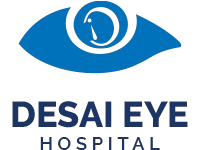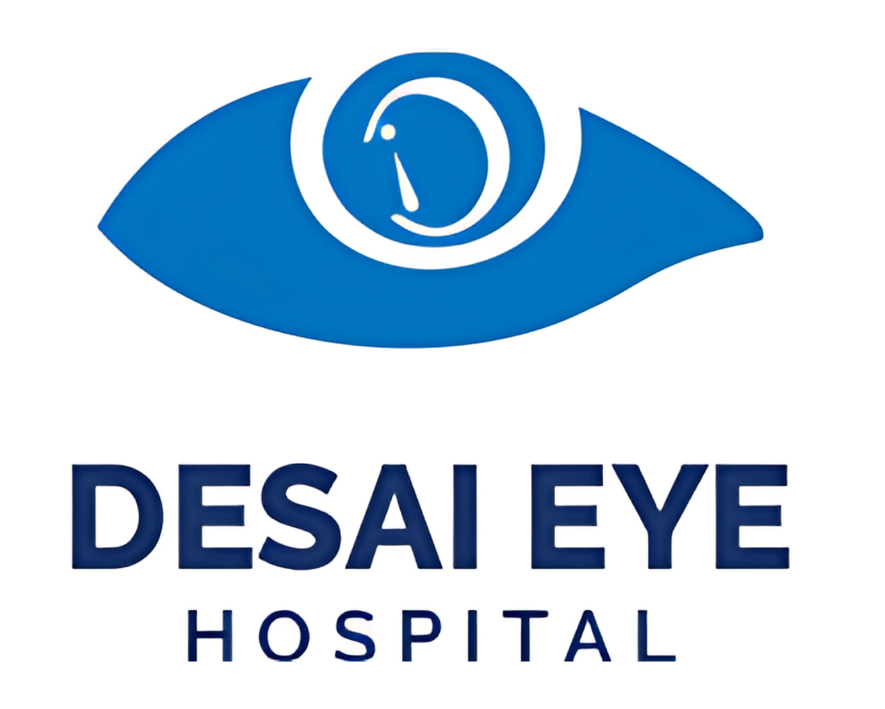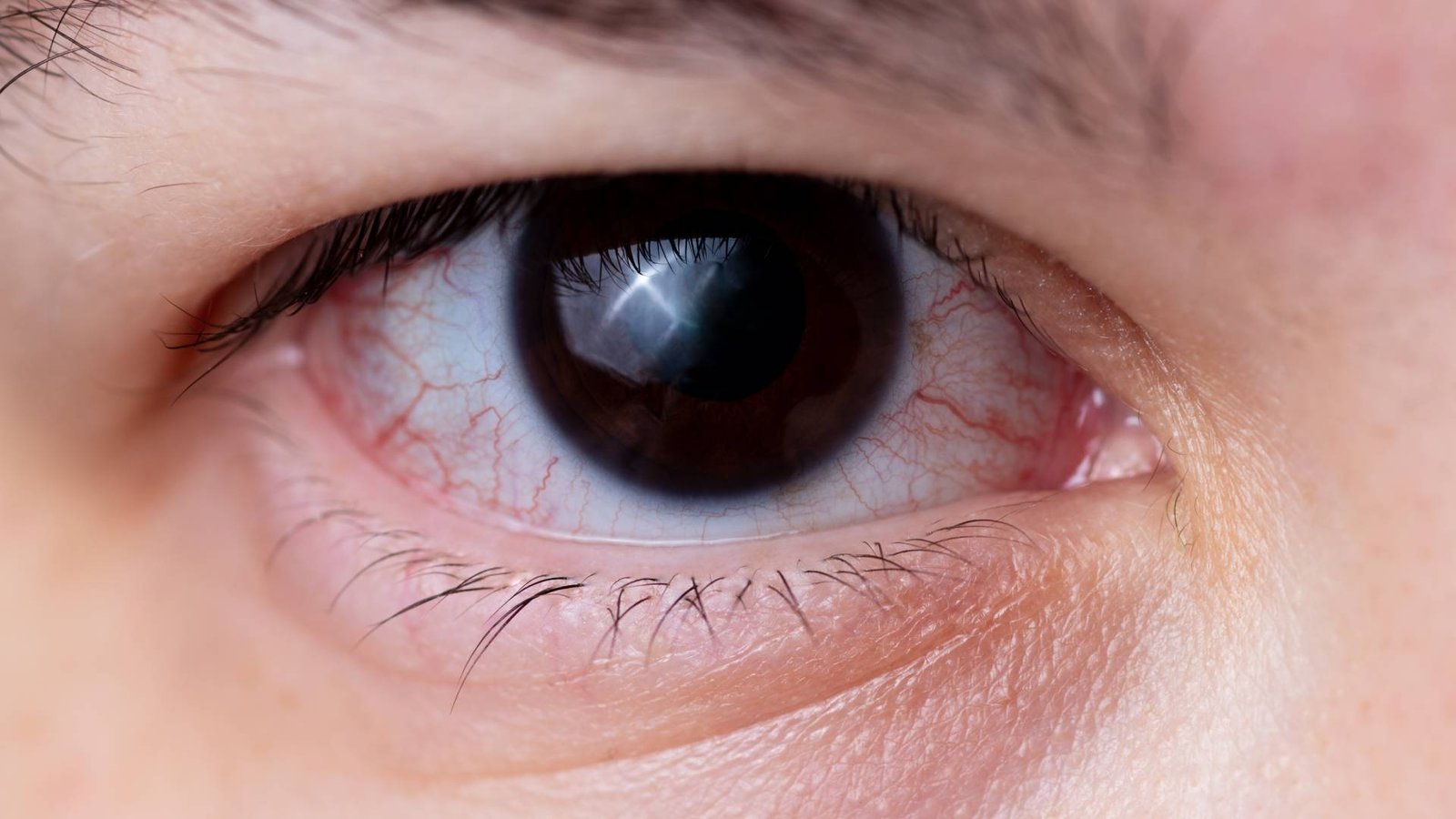The cornea is a transparent, dome-shaped layer at the front of the eye that serves as a protective barrier and helps focus light entering the eye. As the first point of contact for light, it plays a vital role in vision. Any damage or condition affecting the cornea can lead to blurry vision, discomfort, and, in severe cases, permanent vision loss. At Desai Eye Hospital, Vadodara, we provide expert diagnosis, treatment, and management for various corneal conditions, ensuring that our patients receive the highest quality of care to preserve and enhance their vision.
What is the Cornea?
The cornea is the clear outermost layer of the eye that covers the iris, pupil, and anterior chamber. It plays a significant role in the refraction of light, which helps the eye focus images. Its transparency and curvature are essential for optimal vision, and it also acts as a barrier to dust, germs, and other harmful particles.
Common Corneal Disorders:
Corneal Ulcers:A corneal ulcer is an open sore on the cornea, typically caused by infections, trauma, or dry eyes. It can result in pain, redness, and impaired vision.
Keratoconus:Keratoconus is a condition in which the cornea becomes thin and begins to bulge outward, forming a cone-like shape. This can cause distorted or blurry vision and may require corrective lenses or surgery.
Corneal Dystrophies:Corneal dystrophies are inherited disorders that cause gradual degeneration of the cornea. These conditions, such as Fuchs’ dystrophy or granular dystrophy, can lead to visual impairment over time.
Corneal Scarring:Scarring of the cornea can occur from previous infections, trauma, or surgery, and it can obstruct light from reaching the retina, causing blurred vision.
Dry Eye Syndrome:Inadequate tear production or poor-quality tears can cause the cornea to dry out, leading to irritation, redness, and a sensation of grittiness.
Corneal Transplantation:In cases where the cornea becomes severely damaged or diseased, a corneal transplant (keratoplasty) may be necessary. This procedure involves replacing the damaged cornea with a healthy donor cornea.
Symptoms of Corneal Disorders
The symptoms of corneal conditions vary based on the severity and type of disorder but often include:
- Blurred or Distorted Vision: The most common symptom, particularly in conditions like keratoconus and corneal dystrophies.
- Eye Pain or Discomfort: Often associated with corneal ulcers, abrasions, or infections.
- Redness and Swelling: Indicating inflammation or infection in the cornea.
- Sensitivity to Light (Photophobia): A common symptom in corneal infections or injuries.
- Excessive Tearing: Frequently seen in cases of corneal abrasions or dry eye syndrome.
- Grittiness or Foreign Body Sensation: Often reported by individuals with dry eyes or corneal abrasions.
Causes of Corneal Disorders
Several factors can lead to corneal conditions, including:
Infections: Bacterial, viral, fungal, or parasitic infections can cause corneal ulcers and scarring.
Genetics: Certain corneal diseases, such as keratoconus and corneal dystrophies, are inherited.
Trauma: Physical injuries to the eye, such as scratches or foreign objects, can damage the cornea and lead to ulcers or scarring.
Dry Eyes: Insufficient or poor-quality tear production can dry out the cornea, leading to irritation and discomfort.
Aging: As we age, conditions like Fuchs’ dystrophy and corneal endothelial cell loss become more common.
UV Exposure: Prolonged exposure to ultraviolet (UV) light can increase the risk of developing cataracts or corneal conditions such as pterygium.
Diagnosis of Corneal Disorders
At Desai Eye Hospital, we employ a variety of advanced diagnostic tools to assess and diagnose corneal conditions. The diagnosis typically involves:
Slit Lamp Examination:A detailed examination of the cornea using a special microscope that provides a magnified view of the eye’s structures. This helps identify ulcers, scars, or abnormalities.
Corneal Topography:This non-invasive test maps the curvature of the cornea, which is particularly useful in diagnosing keratoconus or other conditions that cause irregularities in corneal shape.
Specular Microscopy:Used to evaluate the health of the corneal endothelium (the innermost layer of the cornea), which is crucial in conditions like Fuchs’ dystrophy.
Fluorescein Staining:A dye is applied to the eye to detect scratches, abrasions, or ulcers on the cornea.
Pachymetry:A test to measure the thickness of the cornea, which is important for evaluating conditions like glaucoma and keratoconus.
Culture and Sensitivity Testing:
In cases of infection, a sample from the corneal ulcer or discharge may be taken to determine the cause of the infection and guide treatment.
Treatment of Corneal Disorders
The treatment for corneal conditions depends on the specific diagnosis and the severity of the disorder. Options include:
Medications:
Antibiotics or Antifungals for infections, depending on the type of microorganism.
Anti-inflammatory medications such as corticosteroids may be prescribed to reduce inflammation in the cornea.
Lubricating Eye Drops: For conditions like dry eyes, artificial tears can help keep the cornea hydrated and alleviate discomfort.
Surgical Treatment:
Corneal Transplantation (Keratoplasty): If the cornea is severely damaged, a corneal transplant may be performed to restore vision.
Crosslinking (CXL): This is a treatment for keratoconus where the corneal collagen is strengthened to slow or stop the progression of the disease.
Limbal Stem Cell Transplantation: For patients with severe corneal damage or scarring that cannot be corrected by other means.
Refractive Surgery (LASIK or PRK): In some cases, refractive surgery can be performed to correct vision issues caused by corneal irregularities.
Corneal Bandage Lenses:In cases of corneal abrasions or ulcers, a bandage contact lens may be placed on the eye to protect the cornea and promote healing.
Conclusion
The cornea is an essential component of eye health, and any disorder affecting it can significantly impact vision. At Desai Eye Hospital in Vadodara, we are equipped with the latest technology and expertise to diagnose and treat a wide range of corneal conditions. If you experience symptoms like blurred vision, eye pain, or irritation, don’t hesitate to contact us for an evaluation. Our team is committed to preserving and improving your vision through personalized care and advanced treatments.
Contact Information:
Desai Eye Hospital
2nd Floor, Sakar East Complex
Next to Shilp Residency, Opposite Bansal Mall
Tarsali, Vadodara, Gujarat 390004
Phone: 0265 298 0298
Working Hours:
Mon – Fri: 08:00 AM – 6:00 PM
Saturday: 09:30 AM – 05:00 PM
Sunday: 09:00 AM – 03:30 PM
For patients’ convenience, we offer cashless tie-ups with major insurance providers and corporate associations. Schedule an appointment today for expert care and treatment for corneal disorders.


